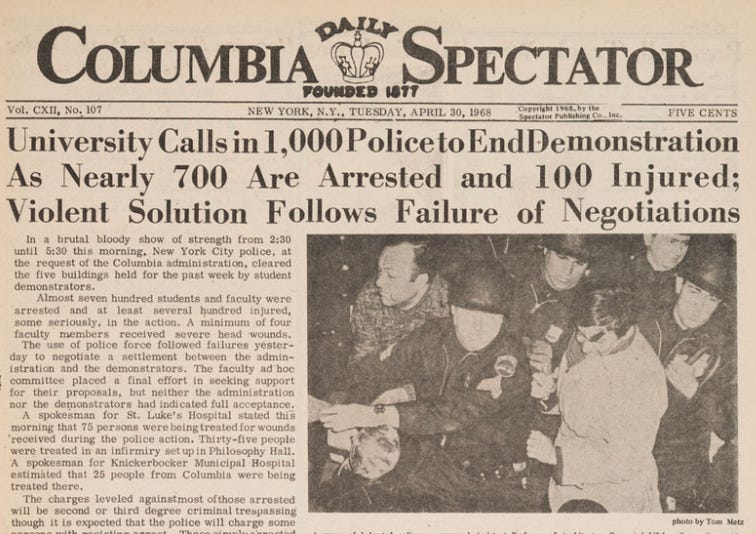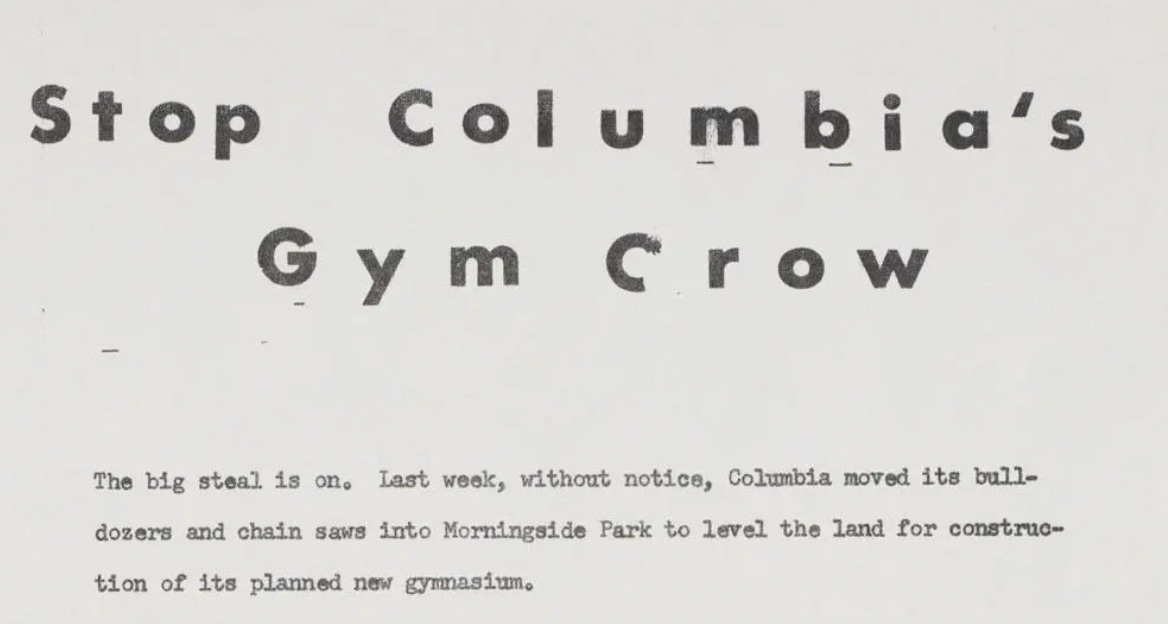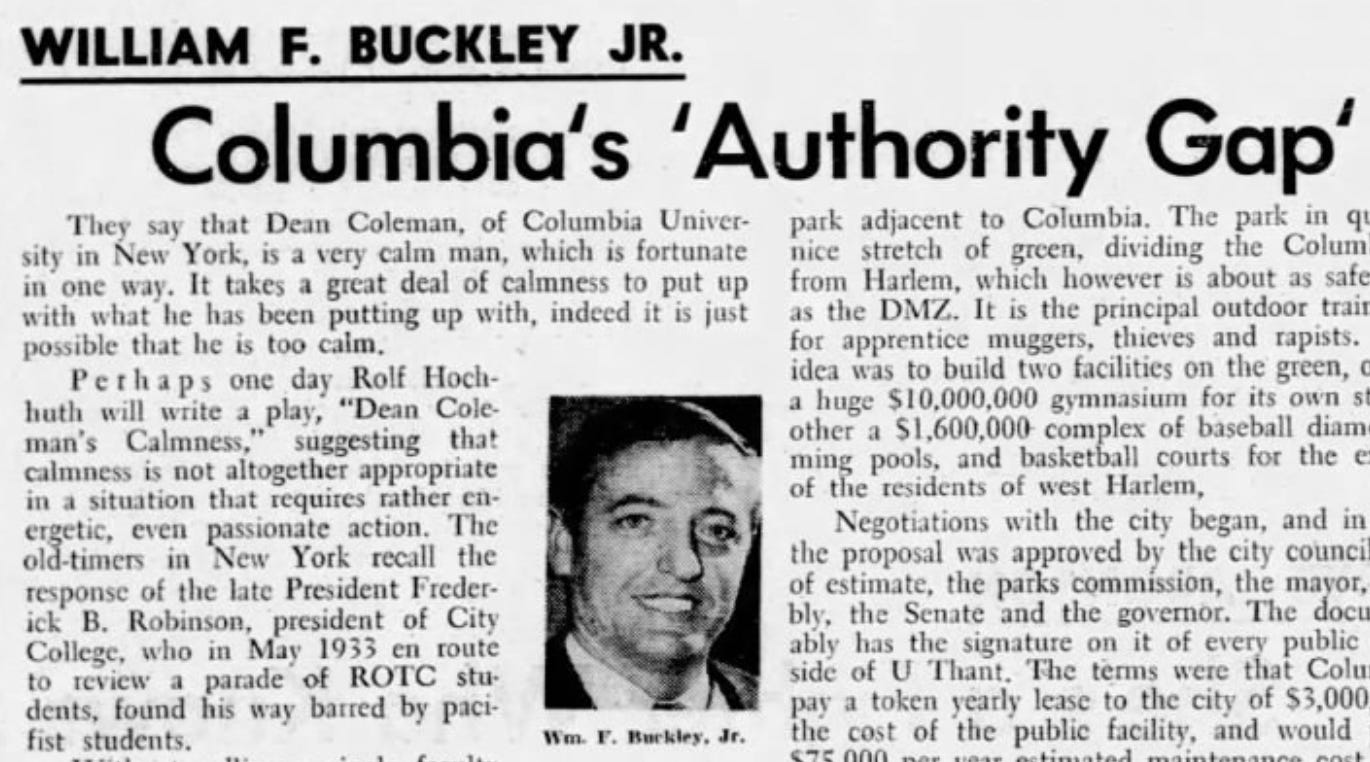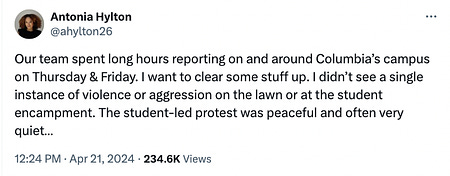Columbia University protests and the lessons of "Gym Crow"
Popular Information doesn't just break news; it creates change. Consider a few examples:
But today, this newsletter's future is uncertain. About half of our current readership found out about Popular Information through Twitter. But Elon Musk, who bought Twitter and renamed it X, has changed the algorithm to promote his own right-wing views and suppress links from independent publishers like Popular Information. That's why I need your help. Popular Information has 319,000 readers, but only a small percentage are paid subscribers. If more readers upgrade to paid, Popular Information can invest in alternative growth strategies, reach more people, and produce more groundbreaking accountability journalism. In the early morning hours of April 30, 1968, then-Columbia University President Grayson Kirk summoned the NYPD to arrest hundreds of student protestors. About 1,000 police officers arrived on campus and, wielding nightsticks, violently arrested about 700 students. Almost 150 protesters ended up in the hospital with lacerations, a few broken bones, and other injuries. The student protesters had occupied several university buildings, forcing the school to suspend classes, in protest of Columbia's plans to build a large gymnasium in Morningside Park, a public park used by the Black community in Harlem. Columbia was planning to build the gym on public land, but 88% of the facility would be limited to staff and students. Only 12% of the gym would be available to community residents, and they would be forced to use a separate entrance at the bottom of the facility. Protesters called the proposal "Gym Crow." Others involved in the protest, which occurred against the backdrop of the Vietnam War, objected to Columbia's involvement with the Institute for Defense Analyses, an organization that conducted "weapons evaluation and other research for the Department of Defense." Columbia was goaded into action by the political right. In a column, National Review founder William F. Buckley chided Columbia for having an "authority gap." Buckley claimed that the protests were not about the gym. (Forcing "Negros" to use a separate entrance to the gym was not evidence of "race prejudice," Buckley argued.) Rather, the protests were simply a result of "children… looking for an opportunity to rebel." Buckley urged Kirk to call the police on his own students. While Buckley's view prevailed on April 30, over the years, Columbia came to embrace the protests — and political activism — as an important part of its legacy. In the aftermath of the police raid, the university sided with the protestors, "canceling the gym and severing ties with a weapons-research institute affiliated with the Defense Department." Kirk resigned as president within a year. It also resulted in structural reforms at Columbia that were designed to give students and faculty a more formal role in setting university policy. In 1969, the University Senate, a 100-person body consisting mostly of faculty and students, was created by referendum. Today, the University Statutes stipulate that a president may only consider summoning the NYPD (or other "external authorities") to end a demonstration if it "poses a clear and present danger to persons, property, or the substantial functioning of any division of the University." Even then, the University Statutes require "consultation with a majority of a panel established by the University Senate’s Executive Committee" before the president takes action. In 2018, on the 50th anniversary of the 1968 arrests, then-Columbia President — and noted First Amendment scholar — Lee Bollinger said the decision to call in the NYPD in 1968 was “a serious breach of the ethos of the university.” By 2018, "a tradition of student protest is touted as part of the [Columbia University] brand." But now, 56 years later, history is repeating itself. Columbia University in 2024On April 18, 2024, Columbia President Minouche Shafik wrote the NYPD regarding a group of students who were occupying the campus' south lawn. The day before, the students had established a "Gaza Solidarity Encampment" in protest of Israel's operations in Gaza — and Columbia's investments in companies allegedly profiting from the war. The Israeli assault on Gaza, launched in response to Hamas' October 7, 2023, terrorist attack, has killed thousands of civilians and created a humanitarian crisis. Shafik accused the Columbia students, whose tuition costs $66,000, of trespassing on their own campus. She requested "the NYPD’s help to remove these individuals." Shafik claimed the students were not authorized to protest on the lawn and posed a "clear and present danger." (A policy limiting protests to designated areas was only put in place in February.) The NYPD responded to the request by descending on the University and arresting 108 students. Some students were restrained in zip ties for several hours and transported to a local police precinct before being released. Shafik also said that all students "participating in the encampment" have been "suspended" for an indefinite period. According to the NYPD, the protest was entirely non-violent. "To put this in perspective, the students that were arrested were peaceful, offered no resistance whatsoever, and were saying what they wanted to say in a peaceful manner," NYPD Chief John Chell said. Antisemitism exists on and off the Columbia campus. But the mass arrests conflated peaceful pro-Palestinian protests with prejudice and hatred toward Jewish people. Shafik claimed she "complied with the requirements of Section 444 of the University Statutes." Section 444 requires "consultation" with the University Senate Executive Committee. While Shafik informed the committee of her decision, it is unclear if a genuine consultation occurred. "The executive committee did not approve the presence of NYPD on campus," Jeanine D’Armiento, chair of the Committee, told the Columbia Spectator. Like in 1968, shortly before Shafik called in the NYPD, she faced substantial political pressure from the right. On April 17, 2024, the day before the NYPD raid, Shafik testified for three hours before the Republican-controlled House Committee on Education. The hearing, Columbia in Crisis: Columbia University’s Response to Antisemitism, was modeled after prior hearings that forced the presidents of Harvard and the University of Pennsylvania to resign. (Shafik missed the earlier hearing because she was traveling internationally.) Throughout last week's hearing, Shafik and other representatives of Columbia touted their "work with external investigators and the Federal Bureau of Investigation to identify and discipline students who breach policy." Shafik assured members of the committee that Columbia students "are getting the message that violations of our policies will have consequences." During the hearing, Congressman Rick Allen (R-GA) told Shakik that, in the Bible, God is "real clear" that "if you bless Israel, I will bless you" and "if you curse Israel, I will curse you." Allen asked Shakik if she wanted "Columbia University to be cursed by God?" "Definitely not," Shafik replied. 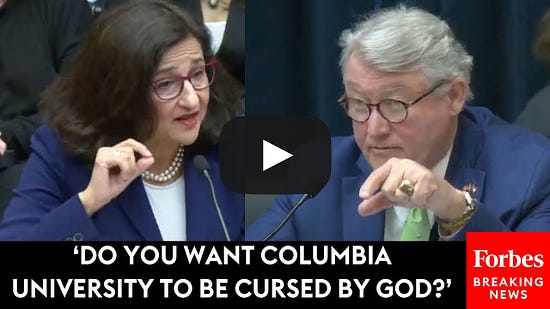 At the conclusion of the hearing, Chair Virginia Foxx (R-NC) warned Shafik that "there is still a significant amount of work to be done" at Columbia, and she expected to see "tangible progress." Irene Mulvey, the president of the American Association of University Professors, called the hearing "a new era of McCarthyism where a House Committee is using college presidents and professors for political theater." Shafik's actions were blasted in a statement issued on Friday by the Columbia and Barnard College chapters of the American Association of University Professors:
Shafik also drew a rebuke from the Columbia student council. In a statement, the council said that "students possess the inherent right to engage in peaceful protest without fear of retribution or harm” and called for "the preservation of freedom of speech and expression among students." Shafik's actions, however, appear to have backfired. In the wake of mass arrests, the protests on the south lawn have continued and inspired others to protest in solidarity across the globe. The Columbia protesters are now calling not only for divestment but, in an echo of the 1968 protests, "an end to Columbia expansion into West Harlem." White House issues statementOn Sunday, the White House released a statement in response to the protests at Columbia, denouncing "calls for violence and physical intimidation targeting Jewish students":
What incidents prompted this statement? A White House spokesperson did not immediately respond to a request for comment. But some media outlets are interpreting it as a response to this video, in which two unidentified men promise more terrorist attacks against Israel. According to the individual who posted the video, the incident did not occur on Columbia's campus. There is no evidence that Columbia students were involved. An NBC reporter, Antonia Hylton, who was on Columbia's campus with protesters, reported no instances of "violence or aggression" among students. Hylton said she observed aggression outside the campus gates but that these incidents did not involve students. |
Older messages
Senate nominee bankrolled by far-right activist trashing MLK and the Civil Rights Act
Thursday, April 18, 2024
Last month, Bernie Moreno won the Republican nomination for US Senate in Ohio. Moreno benefited from an early endorsement from Turning Point Action, the far-right activist group founded by Charlie Kirk
Meet the people spending $800,000 or more to make Trump the next president
Wednesday, April 17, 2024
Donald Trump tried to overturn the 2020 presidential election, was recently found liable for sexual assault, and has been charged with 88 felonies. Trump is currently spending four days a week at the
Who pays on Tax Day
Tuesday, April 16, 2024
Yesterday was the last day for Americans to file their 2023 taxes on time. What is the biggest difference between Tax Day this year and Tax Day in 1980? Millionaires pay a lot less. Between 1945 and
Senate spotlight: A Trump Republican's China problem
Monday, April 15, 2024
November's election will not only determine which party controls the White House but also the United States Senate. Currently, the Democratic caucus holds a narrow 51-49 advantage. Control of the
People v. Trump
Saturday, April 13, 2024
Next Monday, April 15, Donald Trump will report to the Manhattan Criminal Courthouse to stand trial. According to the official summary released this week by Judge Juan Merchan, the case involves
You Might Also Like
Surprise! People don't want AI deciding who gets a kidney transplant and who dies or endures years of misery [Mon Mar 10 2025]
Monday, March 10, 2025
Hi The Register Subscriber | Log in The Register Daily Headlines 10 March 2025 AI Surprise! People don't want AI deciding who gets a kidney transplant and who dies or endures years of misery
How to Keep Providing Gender-Affirming Care Despite Anti-Trans Attacks
Sunday, March 9, 2025
Using lessons learned defending abortion, some providers are digging in to serve their trans patients despite legal attacks. Most Read Columbia Bent Over Backward to Appease Right-Wing, Pro-Israel
Guest Newsletter: Five Books
Sunday, March 9, 2025
Five Books features in-depth author interviews recommending five books on a theme Guest Newsletter: Five Books By Sylvia Bishop • 9 Mar 2025 View in browser View in browser Five Books features in-depth
GeekWire's Most-Read Stories of the Week
Sunday, March 9, 2025
Catch up on the top tech stories from this past week. Here are the headlines that people have been reading on GeekWire. ADVERTISEMENT GeekWire SPONSOR MESSAGE: Revisit defining moments, explore new
10 Things That Delighted Us Last Week: From Seafoam-Green Tights to June Squibb’s Laundry Basket
Sunday, March 9, 2025
Plus: Half off CosRx's Snail Mucin Essence (today only!) The Strategist Logo Every product is independently selected by editors. If you buy something through our links, New York may earn an
🥣 Cereal Of The Damned 😈
Sunday, March 9, 2025
Wall Street corrupts an affordable housing program, hopeful parents lose embryos, dangers lurk in your pantry, and more from The Lever this week. 🥣 Cereal Of The Damned 😈 By The Lever • 9 Mar 2025 View
The Sunday — March 9
Sunday, March 9, 2025
This is the Tangle Sunday Edition, a brief roundup of our independent politics coverage plus some extra features for your Sunday morning reading. What the right is doodling. Steve Kelley | Creators
☕ Chance of clouds
Sunday, March 9, 2025
What is the future of weather forecasting? March 09, 2025 View Online | Sign Up | Shop Morning Brew Presented By Fatty15 Takashi Aoyama/Getty Images BROWSING Classifieds banner image The wackiest
Federal Leakers, Egg Investigations, and the Toughest Tongue Twister
Sunday, March 9, 2025
Homeland Security Secretary Kristi Noem said Friday that DHS has identified two “criminal leakers” within its ranks and will refer them to the Department of Justice for felony prosecutions. ͏ ͏ ͏
Strategic Bitcoin Reserve And Digital Asset Stockpile | White House Crypto Summit
Saturday, March 8, 2025
Trump's new executive order mandates a comprehensive accounting of federal digital asset holdings. Forbes START INVESTING • Newsletters • MyForbes Presented by Nina Bambysheva Staff Writer, Forbes

